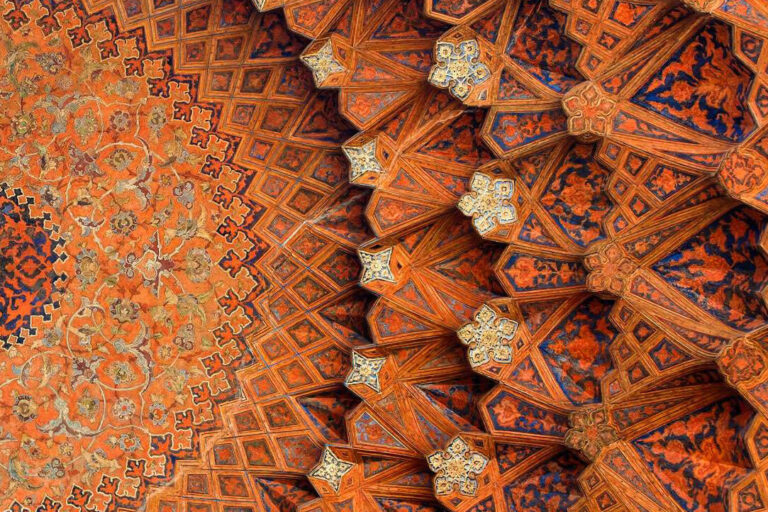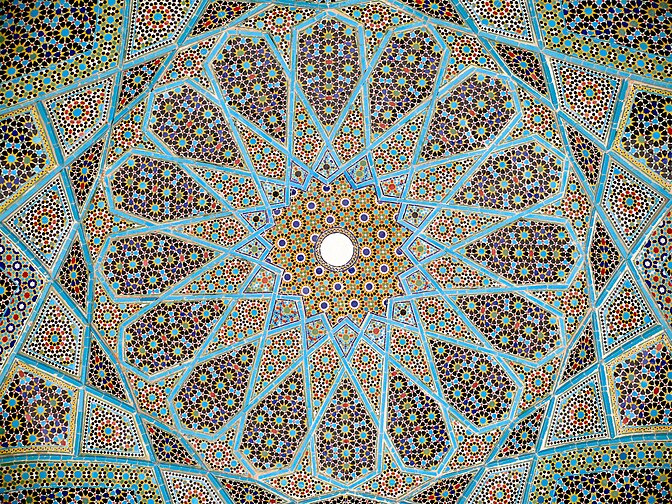Meaning and Significance
Arabic Roots
Fatimah, a name with profound meaning and historical significance, derives from Arabic roots that resonate throughout Islamic tradition and beyond.
Its etymology unveils a story of purity, excellence, and enlightenment.
The root word “fath,” from which Fatimah originates, carries multiple connotations:
- Splendor and radiance
- Victory and triumph
- Enlightenment and knowledge
- Thus, Fatimah is often interpreted as “the one who shines,” “the victorious one,” or “the enlightened.”
- Beyond its lexical meaning, Fatimah embodies a powerful symbolism within Islamic culture.
- As the daughter of Prophet Muhammad and his beloved wife Khadijah, she occupies a revered position in history.
- Fatimah’s life exemplifies virtues such as piety, humility, strength, and unwavering faith.
- Her name has become synonymous with these qualities, serving as an inspiration for generations of Muslim women.
- The legacy of Fatimah extends far beyond the confines of Islam.
- Her name resonates globally, adopted by individuals from diverse backgrounds who are drawn to its inherent beauty and profound meaning.
Connection to Islamic Tradition
Fatimah, the singular Arabic feminine form of the noun “Fat-h,” derives from the root word “fataha” meaning “to shine bright,” “to be luminous,” or “to open wide.” This etymology imbues Fatimah’s name with connotations of intelligence, beauty, enlightenment, and spiritual radiance.
Within the Islamic tradition, Fatimah holds a profound significance, being the only surviving daughter of Prophet Muhammad and his beloved wife Khadija. She is revered as a paragon of virtue, piety, and resilience, embodying the highest ideals of Islamic womanhood.
Fatimah’s life story, though often recounted through hadith (sayings attributed to the Prophet), is characterized by her unwavering faith, deep connection with Allah, and steadfast support for her father and the nascent Muslim community. She remained a beacon of strength even during times of persecution and hardship.
Here are some key aspects highlighting Fatimah’s meaning and significance within Islam:
Symbol of Purity and Devotion
Fatimah is often associated with purity, chastity, and profound devotion to Allah. Her life serves as a model for Muslim women striving towards spiritual excellence.
Advocate for Justice
Fatimah is known for her outspokenness and unwavering stance against injustice. She fearlessly challenged authority when it veered from the righteous path, upholding Islamic principles of justice and equity.
Epitome of Family Values
Fatimah’s relationship with her father and family exemplified love, respect, and loyalty. Her role as a wife to Imam Ali, another prominent figure in Islam, further highlights the importance of familial bonds within the faith.
Legacy of Learning and Scholarship
Fatimah was known for her intelligence and deep understanding of religious texts. Her lineage continued to produce notable scholars and intellectuals, contributing significantly to Islamic thought and scholarship.
Fatimah’s name continues to be widely bestowed upon Muslim girls, signifying the values of light, wisdom, strength, and piety that she embodies.
Historical Origins
Prevalence in Early Muslim Communities
The name Fatimah carries profound historical and cultural significance, deeply rooted in Islamic tradition. Its etymology derives from the Arabic word “فاطمة” (Fatimah), meaning “she who is pure” or “shining one.” This inherent purity and brilliance are reflected in the esteemed position Fatimah holds within Islam.
Historically, the name Fatimah gained prominence with Prophet Muhammad’s daughter, Fatima bint Muhammad. She was the only daughter of the Prophet and his beloved wife Khadija (may Allah be pleased with them both). Known for her piety, intelligence, and unwavering devotion to her father and Islam, she became a role model for Muslim women throughout history.
Within early Muslim communities, the name Fatimah enjoyed widespread popularity. It was seen as a cherished blessing, symbolizing purity, virtue, and closeness to God. Parents bestowed this name upon their daughters, hoping they would emulate Fatima bint Muhammad’s exemplary character and spiritual depth.
The influence of Fatima bint Muhammad extended beyond her own lifetime. Her lineage gave rise to prominent figures in Islam, including Ali ibn Abi Talib (her husband) and his descendants, the Imams of Shia Islam. This lineage further solidified the name Fatimah’s association with religious leadership and spiritual guidance.
The prevalence of Fatimah in early Muslim communities underscores its significance as a symbol of Islamic values and ideals. It represented not only personal piety but also the aspiration to live a life guided by faith, justice, and compassion, much like the Prophet’s daughter who remains an enduring figure of inspiration for Muslims worldwide.
Notable Fatimah Figures in History
The name Fatimah is of Arabic origin, meaning “she who abstains” or “she who is pure.” It is a highly revered name in Islam, stemming from its association with Lady Fatimah al-Zahra, the daughter of Prophet Muhammad.
Historically, the name Fatimah has been prevalent across various cultures and time periods within the Muslim world. Its popularity can be attributed to:
- Religious significance: Lady Fatimah is considered a role model for Islamic women, known for her piety, intelligence, and unwavering devotion to God.
- Cultural influence: The name has been passed down through generations in many Muslim families, becoming an integral part of their cultural heritage.
Notable Fatimah figures throughout history include:
Lady Fatimah al-Zahra (605-632 CE)
The daughter of Prophet Muhammad and his wife Khadija. Highly revered in Islamic tradition, she is known for her piety, wisdom, and strong character.
Fatimah bint Musa
A prominent female scholar from the early Islamic era. Known as “the lady of knowledge,” she made significant contributions to Islamic jurisprudence.
Fatima al-Firhi
An 11th-century Andalusian scholar and poet who wrote extensively on Islamic philosophy and literature. She was known for her eloquence and intellectual prowess.
The name Fatimah continues to be a popular choice among Muslim parents worldwide, symbolizing purity, strength, and devotion. Its rich historical context and association with prominent female figures solidify its significance in Islamic culture and beyond.
Global Distribution and Modern Usage
Geographic Spread of the Name
Fatimah, a name deeply rooted in Islamic tradition, transcends geographical boundaries and resonates with diverse cultures worldwide. Its global distribution reflects its enduring significance as a symbol of faith, purity, and strength within the Muslim community.
The name’s popularity extends far beyond the Middle East, encompassing countries across North Africa, Europe, Asia, and even parts of the Americas. In many regions, Fatimah is among the most common female given names, reflecting its enduring appeal and cultural resonance.
The geographic spread of Fatimah can be traced to the Prophet Muhammad’s daughter, Fatima Zahra, who holds a revered position in Islamic history. Her exemplary life and devotion serve as an inspiration for countless Muslims around the world.
Within Arabic-speaking communities, Fatimah is widely used as a testament to the Prophet’s love for his daughter and her profound spiritual connection. The name carries connotations of purity, virtue, and divine guidance, making it a cherished choice for parents seeking to instill these values in their daughters.
Beyond its religious significance, Fatimah has also gained popularity as a beautiful and elegant name with universal appeal. Its lyrical sound and graceful meaning have captivated people from various cultures, contributing to its widespread adoption.
In contemporary society, Fatimah is celebrated by Muslims and non-Muslims alike. Its enduring legacy as a symbol of strength, resilience, and compassion continues to inspire generations.
Variations and Adaptations Across Cultures
Fatimah (Arabic: فاطمة, romanized: Fatīmah) is a feminine Arabic given name meaning “she who is bright,” “shining one,” or “one who excels.” It is deeply rooted in Islamic tradition, derived from the name of the Prophet Muhammad’s daughter, Fatima Zahra.
Fatimah’s global distribution is significant. While predominantly prevalent in Muslim-majority countries across Africa, the Middle East, South Asia, and Southeast Asia, its reach extends beyond these regions. Due to migration patterns and interfaith relationships, Fatimah has gained recognition and usage in Western nations like the United States, Canada, and Europe.
The name’s enduring popularity stems from several factors:
Religious Significance
atima Zahra is highly revered in Islam. Muslims consider her a role model for piety, virtue, and strength. As the Prophet Muhammad’s only surviving daughter, she occupies a central place in Islamic history and theology.
Aesthetic Appeal
The name Fatimah has a pleasing sound and rhythm, making it appealing across various cultural contexts.
Meaningful Connotation
The association with brightness, excellence, and radiance resonates positively with parents seeking auspicious names for their daughters.
Variations and Adaptations Across Cultures:
While the original Arabic form “Fatimah” remains the most common, cultural adaptations have resulted in diverse variations:
- Persian: Fatemeh or Fatimeh
- Turkish: Fatma
- Urdu and Hindi: Fatima
- Malay: Fatimah
- French: Fatimé
These variations often reflect phonetic adaptations to different languages while preserving the essence of the original meaning. In some instances, alternative spellings like “Fatima” or “Fatma” are also used.
- Best LeadsGorilla Alternatives for 2025 - April 26, 2025
- Best Overloop Alternatives for 2025 - April 25, 2025
- Best Lead411 Alternatives for 2025 - April 25, 2025


